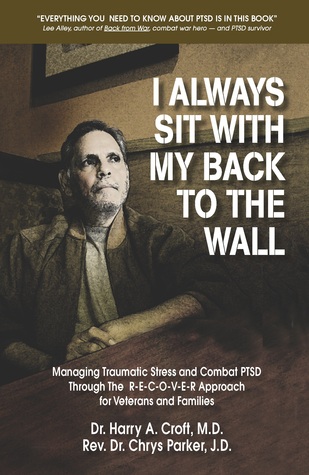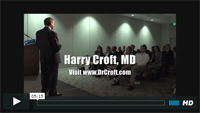Better Presentations with Less Anxiety
- Aug
- 23
- Posted by admin
- Posted in Uncategorized
A Primer for Professionals
By: Harry Croft, M.D.
www.drcroft.com 210-602-9418
As professionals, we talk to our clients, their family members, and other professionals without much difficulty. We are usually helpful, articulate, and comfortable. But when we are giving a more formal talk to a larger group that we don’t know well, we are frequently uncomfortable, and anxious in preparation, and may even freeze up during the presentation. And that’s unfortunate. We often have so much anxiety that we deny ourselves the chance to educate others by turning down future opportunities to speak. In this list, I will present my Top 10 Tips to increase confidence and comfort levels for those presentations.
- Remember that it is the audience members who are the focus of your talk. Design the information to be presented for them. Recognize that although you are the content expert, it is your audience that decides on the impact of your presentation. So make THEM the focus of your talk. The more you know about your audience, the more effective your preparation for them will be.
- Most audience members will remember only 50% of the information you have given them at the end of your talk, and less than 10% after than a week, so to improve memory develop your talk based on no more than 3-6 major points, and repeat them multiple times during your talk
- At any time during your talk about 15% of your audience will “zone out” (Drift) for periods of time.
- Use an outline format in preparing your talk to assure that it flows well and is easily understood. Seeing the outline in writing improves your preparation.
- Practice the talk out loud in order to improve the overall effect it will have on the audience, as well as helping you to become more confident and less anxious in delivering it.
- Write your own introduction and ask the host to read it as written. Make it short (less than 60 seconds) and of interest and meanint to your audience.
- Begin your talk with an opening (both in words and presentation) that gets your audience’s attention quickly (in less than 30 seconds). Speak with passion and enthusiasm. Use repetition and pausesto bring back drifting audience members and to increase memory and impact.
- Avoid movement and “fillers” (“uhs and ahs”) that distract audience attention. Design and use AV materials (such as slides, props) that complement your talk, instead of detracting from it. AV materials are to aid audience learning and not simply to serve as your script.
- Always leave time for questions and answers (generally 10 minutes for a 50-minute talk). During your practice for the talk, time it and say it out loud (for timing purposes). Always finish on time or early – do not run overtime.
- Close strong with a summary of important facts given during talk and/or a call to action by the audience. Prior to your close let the audience know you are about to end — Use terms like “In summary” “In conclusion” “Let me know review the most important information presented.” Leave audience with feeling they are glad they learned something valuable and that they attended.
These are only a few of the points that can increase your competence and confidence in presenting a talk. Use those that apply and modify them to fit your personality and style. The main point is that YOU can give an impactful talk, and leave your audience pleased they attended.
Feel free to contact me with questions or comments: hcroft@drcroft.com
# # #
Dr. Harry Croft is a psychiatric clinician, researcher, educator, author and lecturer from San Antonio, Texas. He has been a member of the Bexar County Medical Society close to 50 years. For the past 35 years, the internationally recognized Dr. Croft has lectured to more than 1,000 groups of medical and lay audiences in all 50 states and 8 foreign countries. He has been a featured speaker at annual meetings of the American Medical Association, American Psychiatric Association, Texas Medical Association and other organizations.
For more than 10 years he has coached and conducted presentations and workshops on how to give better medical talks with less anxiety. He also has coached and conducted presentations and workshops on how to improve media interviews.
As a principal investigator, Dr. Croft has overseen more than 150 clinical trials, including many on the psychiatric medications now in widespread use. He also produced an award-winning TV news feature (The Mind is Powerful Medicine) for more than three decades.
Dr. Croft also received the Meritorious Service Award as a veteran and has evaluated more than 8,000 veterans with PTSD and TBI. He has received awards from the American Psychiatric Association, National Mental Health Association, State of Texas, as well as the National Association of Physician Broadcasters and Who’s Who in America. He has been married to his wife, Benay, for some 55 years.
Search Dr.Croft.com
Dr. Harry Croft’s PTSD Blog
Recent Comments
Archives
- August 2022
- December 2018
- April 2017
- March 2017
- February 2017
- January 2017
- October 2016
- January 2015
- October 2014
- April 2013
Categories
- Abuse
- Alzheimer's
- bipolar
- depression
- Eating Disorder
- flotation therapy
- Media
- PTSD
- Research
- Uncategorized
- Updates




